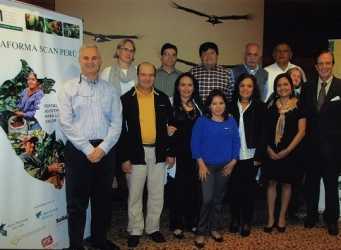The Sustainable Development Model for Peruvian Coffee Project continues with the project closure activities, including a workshop on harvest and post-harvest techniques and the second technical meeting of the SCAN Peru platform.
Workshop on good agricultural practices in harvesting and post harvest
Good agricultural practices applied by farmers during harvest and post-harvest, known as wet and dry processing, influence the final cup quality. Therefore, the Sustainable Development Model for Peruvian Coffee Project in partnership with VECO ANDINO conducted training workshops aimed at small farmers in order to instruct them in the proper handling of coffee beans.
The workshop was held on May 9-10 in San Ignacio and May 12-13 in Pichanaki.
The “Workshop on Exchanging Experiences on Good Agricultural Practices on Wet and Dry processing and its influence on coffee quality” was held in the northern (Cajamarca and Junín) and central (Chanchamayo and Satipo) coffee growing areas of the country.
A new addition to the workshop was the participation of Raul Mamani, a coffee farmer with experience in cup quality, two-time winner of the National Coffee Quality Competition (CECOVASA), along with Theophilus Beingolea Ayala, a specialized technician and consultant for Sustainable Agricultural Chains in VECO ANDINO.
See the press release (in Spanish) for more information about the workshop.
Second meeting of the SCAN Peru Platform in 2016
On 16 and 17 May, representatives of the SCAN Peru Platform had their second technical meeting this year.
During the meeting, important issues such as the impact of the Sustainable Development Model for Peruvian Coffee Project on the over 2,500 beneficiary farmers across the country were addressed, as well as the new challenges on technical assistance, production costs and the research and innovation agenda for the coffee sector.
The importance of continuing the work carried out under the global coffee variety testing was also highlighted. This initiative allows the different farming organizations to be able to plant certified coffee seeds.
For more information see the project Facebook page.


















